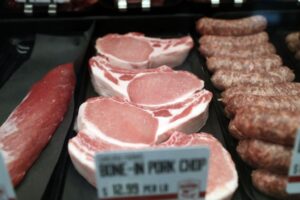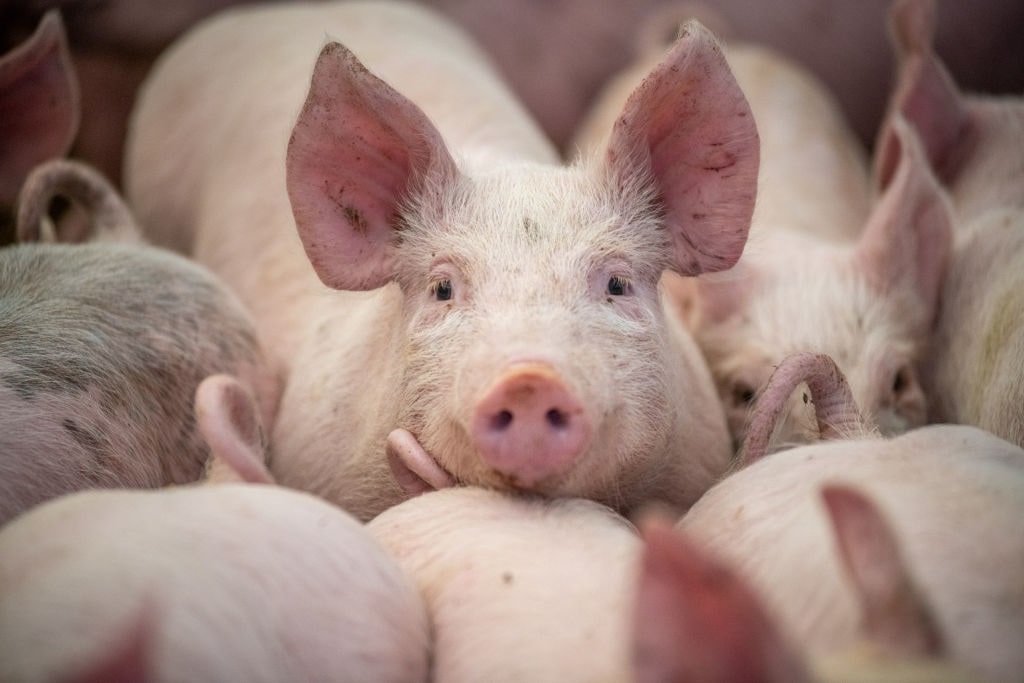The constitutional and economic ramifications of California’s Proposition 12, which banned the sale in California of pork from pigs held in tight confinement, are profound for the American swine industry. The US Supreme Court’s refusal to strike down the law opens the door to challenges on other grounds, but also myriad extensions of in-state regulation that dramatically impact the commerce of other states beyond pork or other food production. With the regulations specifically impacting swine going into effect at the end of July 2023, all components of the regulation are now in force. On the surface, the newly enacted rules appear to address animal welfare. Still, the broader implications of Proposition 12 for national and international commerce – and states’ rights under the U.S. Constitution – are genuinely seismic.
Proposition 12, and Other Pork
Gestation crates are widely employed in the American pork industry to confine sows. This prevents the mothers from eating or inadvertently crushing young piglets, preventing mortality and increasing profitability. It also assists in animal management for disease treatment and prevention.
Animal rights activists in California advanced Proposition 12 to ban the practice, prohibiting the sale of swine products that contain pig parts from confined sows or their progeny. In the name of sparing sows from discomfort, however, more piglets will likely die – an odd moral trade-off. Indeed, as Justice Brett Kavanaugh noted in National Pork Producers Council v. Ross, “according to various amici, some of the scientific literature suggests that California’s requirements could worsen animal health and welfare. See, e.g., Brief for American Association of Swine Veterinarians as Amicus Curiae 4–19 …”
Economic Impacts on Pork Industry and Consumer Prices
California consumes a hefty 13% of US Pork, 99.87% of which is imported. Proposition 12 is unusual because it regulates the production and husbandry practices of other states, including the dispatch of California inspectors across the country to verify compliance. Facility transitions will cost hundreds of millions of dollars, many jobs are imperiled outside of California, and consumer prices are expected to rise.
For national US pork producers to participate in California’s markets, they must either trace animals that comply with the new law’s requirements versus those that don’t or convert their entire operations to meet California’s demands. Excluding the Golden State from distribution is untenable for most businesses, though Smithfield Foods has cut ties and is closing California operations. The nation’s costs of swine production will rise substantially, undermining international competitiveness for the US pork industry against products from nations lacking similar restrictions.
Proposition 12 and the US Constitution
What is unusual about California’s law is that, however well-intentioned, it extends into the realm of regulating activities in other states, which is directly counter to the federalist system. After unilaterally imposing its good intentions on the rest of America and its economy in the form of increased costs, will California send envoys to foreign nations with measuring tapes to inspect pig crate areas and processing facilities?

(Brontë Wittpenn/San Francisco Chronicle via Getty Images)
In National Pork Producers Council v. Ross, the United States Supreme Court dismissed a pork industry challenge to Proposition 12. Since the federal government has not regulated this area of commerce, the Court reasoned, states are free to impose restrictions within their own borders. In a complex alignment of opinions and partial dissents, the Court essentially sanctioned California’s scheme as constitutionally non-violative.
Notably, Justice Kavanaugh’s dissent emphasized the incursion into states’ rights this decision threatens, writing: “The State has aggressively propounded a ‘California knows best’ economic philosophy—where California in effect seeks to regulate pig farming and pork production in all of the United States. California’s approach undermines federalism and the authority of individual States by forcing individuals and businesses in one State to conduct their farming, manufacturing, and production practices in a manner required by the laws of a different State.”
Proposition 12 may seem a sensible ethical course, but it is a Trojan Horse into the citadel of states’ rights. It’s pigs’ rights today, but what cross-boundary regulations will now follow? Justice Kavanaugh recounts examples in his Ross dissent, concluding: “California’s law thus may foreshadow a new era where States shutter their markets to goods produced in a way that offends their moral or policy preferences—and in doing so, effectively force other States to regulate in accordance with those idiosyncratic state demands. That is not the Constitution the Framers adopted in Philadelphia in 1787.”
The British Gammon Experience
The American push to improve swine welfare bears contrasts with the British experience. That nation implemented swine housing regulations before the European Union, and the UK breeding pig population has declined more than 50% since 1997. The Guardian reported:
“The UK moved more quickly than other European countries in banning the practice of keeping pregnant sows in narrow stalls or chains throughout their pregnancies … The EU didn’t ban the practice until 2013. The hope had been that shoppers and retailers would support higher welfare pig meat. Instead, UK pig meat imports from Denmark rose by 50% and from Germany by 400% between 1997 and 2007.”
Had California, like the UK, simply imposed its pig protection strictures on its own turf, it would have undermined only its own producers, of which there are almost none. Like the EU, the federal government might one day regulate porcine welfare and preempt California’s effort with its own. In the interim, California’s progressive initiative will dominate national production. Pork prices there have already nearly doubled, and supplies are becoming scarce. Doubtless, this will encourage yet more Americans to flee that crumbling state.
The Ross decision frees California to tyrannize Iowa, North Carolina, and other pork-producing states with its animal ethics. But it also frees Iowa to ban almonds or other products that consume too much precious groundwater: California’s groundwater territorially, but Iowa’s to govern by morality. Or perhaps in 2025, Vermont will require all pork sold in the state to come from pigs that get ten hours of sunshine daily, listen to Public Radio, and dine on Ben & Jerry’s ice cream at least once weekly. Then we will see what the Supreme Court has to say about states regulating the lands and commercial activities of other states.




